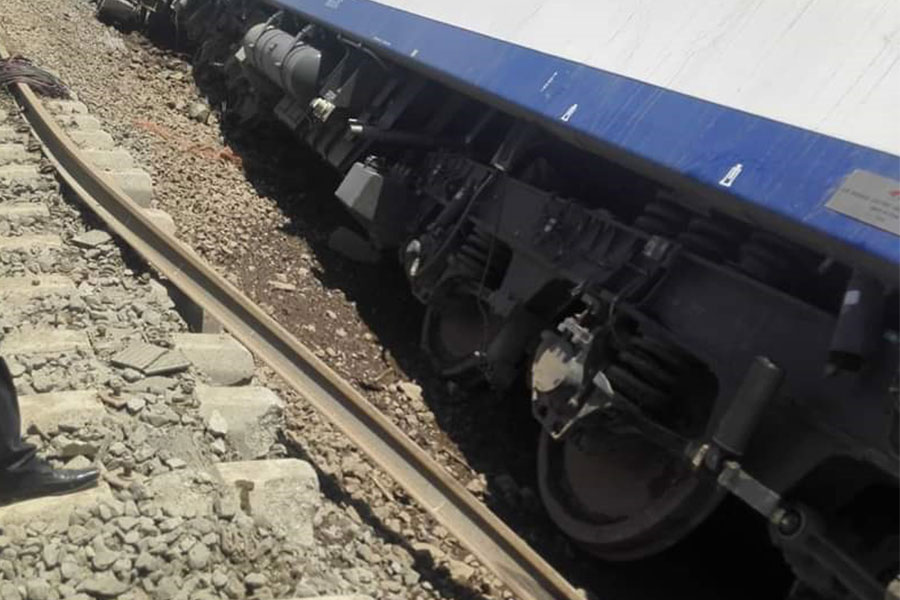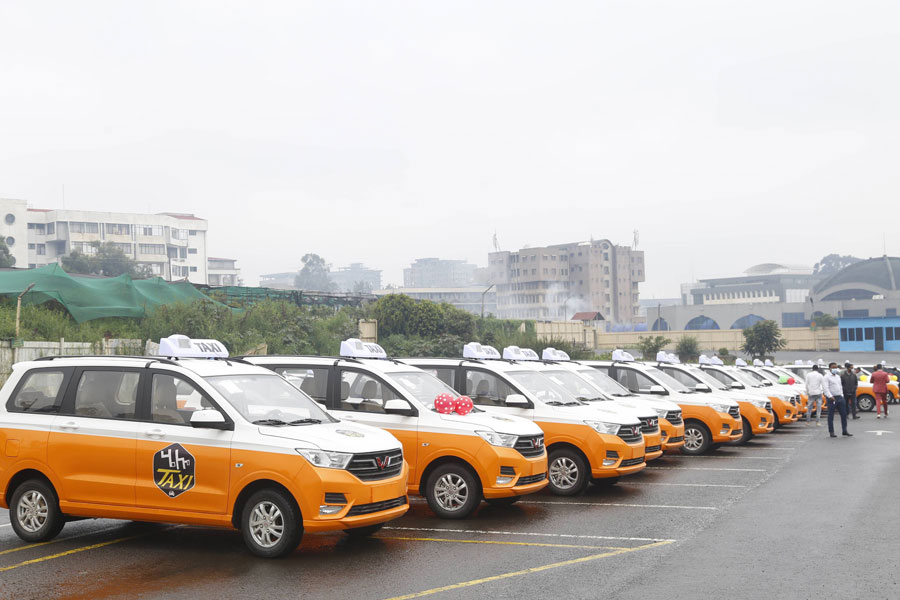
Radar | Feb 23,2019
Alem Abebe was up extra early on June 30, 2020. She had a friend to visit at Qaliti Correctional Facility. She packed him a meal and was ready to leave the house by 6:30am. The plan was to go see her friend, drop off the care package and go back to her shop, a children's clothing and shoe store on the first floor of Africa Building close to Michael roundabout in Jemo, all before 9:00am.
But her plans, like many others just waking up to start their day in the city of Addis Abeba, had to be put strictly on hold. Alem was unaware that a famous singer, Hachalu Hundessa, had been killed the night before, leaving the city and its inhabitants upturned in its wake.
Around 6:30am Alem called a cab, gave him directions and they had barely left her neighborhood when they came across the roadblocks - huge rocks and cement blocks sealing off the road, their first sign that something was amiss. The second sign came a few minutes later, people in the distance running toward them. The driver swiftly turned the car around and took Alem back home.
Internet connectivity was promptly shut down countrywide around 9:00am, the last confirmation that things were not okay.
After a day spent inside wondering what was unfolding in the city, Alem received a call in the afternoon informing her that her shop along with many others in Africa Building had been damaged. Protesters passing by had thrown rocks at the glass walls, shattering them. Her next door neighbors, a café and a clothing shop, had suffered a similar fate.
“My business had stopped being profitable, but I was working with the hope that tomorrow will bring another day, a better one,” she said.
Most of the shop windows on the second floor of the building and all of the ones on the first floor are shattered. Some shop owners had come to put up makeshift doors from plastic or cardboard. Others, like Rosa Bakery, had left it open, there was nothing left to break.
This was part of the aftermath of the protests that have been going on in the city following the death of Hachalu. The protesters had come mostly from outside the capital and had started destroying property on their way in and then out. Many city residents had retaliated.
The streets were left bare, the sidewalks lined mostly with young men in face masks armed with long sticks. The occasional cars on the streets consisted mostly of federal police pick-ups, with police sitting on top, their guns slung to their side or propped between two arms, face masks in place, and the ambulances screeching past.
A person coming from the airport on Africa Avenue (Bole Road) would see that shops were closed save for the occasional supermarket. The colorful fruit shops have packed up their produce and placed their plastic covers over the facades.
A closer inspection reveals much more. The cafes, glass adorned hotels and businesses lining the popular Africa Avenue from the airport have had their windows broken or shattered. One of the hotels, KZ, has a corrugated metal iron sheet closing up the otherwise sophisticated façade of the building.
Workers are busy replacing car windows on Friday, July 3, 2020, at Ephrem Car Dealership after protesters left them shattered last week.
The scene was slightly different down Sierra Leone Street (Debre Zeit Road) where further property damage had been inflicted.
Beyene Leda Butchery was back to work the following day after the protests happened. Unlike Africa Avenue, the butcheries, abundant in that area, are moderately filled with people but not to its usual brimming amount.
Beyene Leda opened its doors over three decades ago when there was barely anything else around the area, according to Girma Ate, the manager of the butchery.
“We opened when there were still trees around us instead of buildings," he said.
About 18 staff and 20 customers were in the eatery when protesters rained a hailstorm of rocks on them on Tuesday at about 10:00am.
“Our customers all went rushing to the back, and one of our staff even lost a tooth as a rock landed on his jaw,” he said.
Beyene Leda, renovated two years ago at a cost of over two million Birr, will require another 150,000 Br to fix up after Tuesday’s debacle, according to the manager.
“They broke all the televisions, the whiskeys and drinks on our shelves and made off with some of it,” he said. “We're deeply sad, and we want the government to take action against the perpetrators.”
Flagot Bar & Restaurant, another similar establishment next door, was dealt the same blow.
Mame Building, a few hundred metres down the road, had all the tinted blue windows on its four stories cracked. The owner believes that had it not been for the metal shutters at the gate that it would have been worse. The building was built in 2004 at a cost of close to six million Birr. With 25 shop owners, mostly mobile and electronics shops, an estimated half a million Birr is required to fix all the damage.
It is not just buildings but cars on the street that have fallen prey to the anger of passing protesters.
Drivers like Birhanu Hailemariam who had parked their cars on the street have returned to find it vandalised beyond recognition. He had briefly left to have tea and returned to find his blue taxi, the means of his livelihood, missing all its windows.
Birhanu, 36, pays 200 Br a day to rent the car from its owner.
“I make about 3,000 Br a month after meals,” he said.
Since the incident took place on Tuesday, his car has been parked in a nearby compound. He has not been able to make any money nor has he brought up the courage to inform the owner of the car about the damage, which is estimated at 10,000 Br.
“I pay the owner on a weekly basis,” he said. “I have to confess soon.”
Birhanu is apprehensive about what the owner is going to say. While it is common knowledge that the protests have caused a lot of damage, the party responsible is not easily identifiable.
A committee made up of the Addis Abeba Police Commission, the Oromia Police Commission, the Office of the Attorney General, the National Information & Security Service and the Federal Police have started gathering information and investigating the reports of crimes committed in the past few days, according to Fasika Fenta (Com), communications head at the city's Police Commission.
“We're gathering daily reports from across the city on the damages inflicted on property,” he said. “Any illegal activities will be met with proportional and legal repercussions.”
Ephrem Gasha of Ephrem Car Dealership is not too hopeful about that.
He is already replacing the broken windows from the cars in his lot. His shoulder was hit by a rock as he tried to fend off the protestors on Tuesday from annihilating his property, and the costs from all the damage add up to close to half a million Birr.
“It’s disheartening to see your property being damaged and no one being able to protect you,” he said. “I built my business from zero, working since I was 13, and now you see that anyone can come and destroy what you’ve built.”
The car lot has 80 cars and the four security guards were no match for the protesters.
“When we got news that they were coming our way, we started driving the cars off to a nearby safe place,” he said. “But they caught us before we could finish transporting all of it.”
The remaining 19 cars in the lot bore the brunt of heavy wooden sticks and rocks.
This holds true for a multitude of neighborhoods and districts in the city. The Addis Abeba Police Commission Commissioner, Getu Argaw, in an official statement on Thursday, July 2, 2020, reported that 254 cars around the city had been damaged and 30 were entirely burnt up. The reports are still being compiled.
The glass and facades that have been broken down may be repaired, but the psychological, emotional and social repercussions are the ones to look out for, according to Solomon Sisay, CEO of Rework Inc Business & Investment Consultancy.
“Employees at this time will be dealing with questions of safety,” said Solomon. "Being emotionally unwell will affect how you function at work, and this will create a strain on social interaction."
The country is still reeling from the Novel Coronavirus (COVID-19) and now has to come to terms with another national issue. The government needs to lay down a national road map for dealing with both COVID-19 and the current situation, according to Solomon.
"These aren't just businesses. There're individuals behind them," he said. "We’re not just talking about the accessibility of loans but more specifically creating a space where they share the challenges and have a dialogue."
This is the key to lasting solutions, according to him.
PUBLISHED ON
Jul 10,2020 [ VOL
21 , NO
1054]

Radar | Feb 23,2019

Fortune News | Dec 28,2019

Fortune News | Oct 26,2019

Fortune News | Aug 04,2024

Fortune News | Dec 10,2018

Fortune News | Apr 20,2019

Radar | Sep 27,2020

Radar | Sep 07,2025

Fortune News | Dec 28,2019

Featured | Feb 20,2021

Dec 22 , 2024 . By TIZITA SHEWAFERAW
Charged with transforming colossal state-owned enterprises into modern and competitiv...

Aug 18 , 2024 . By AKSAH ITALO
Although predictable Yonas Zerihun's job in the ride-hailing service is not immune to...

Jul 28 , 2024 . By TIZITA SHEWAFERAW
Unhabitual, perhaps too many, Samuel Gebreyohannes, 38, used to occasionally enjoy a couple of beers at breakfast. However, he recently swit...

Jul 13 , 2024 . By AKSAH ITALO
Investors who rely on tractors, trucks, and field vehicles for commuting, transporting commodities, and f...

Oct 11 , 2025
Ladislas Farago, a roving Associated Press (AP) correspondent, arrived in Ethiopia in...

Oct 4 , 2025
Eyob Tekalegn (PhD) had been in the Governor's chair for only weeks when, on Septembe...

Sep 27 , 2025
Four years into an experiment with “shock therapy” in education, the national moo...

Sep 20 , 2025
Getachew Reda's return to the national stage was always going to stir attention. Once...